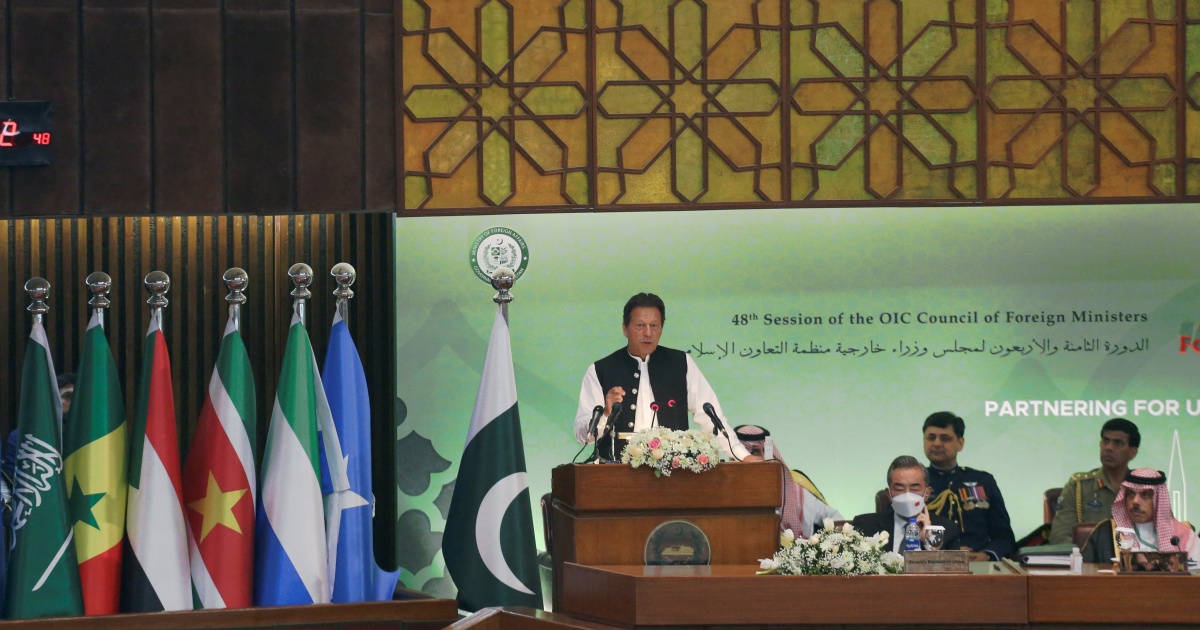
Pakistani leader asks Muslim-majority nations to help end Russia’s war in Ukraine, appealing also to China to join the effort.
Pakistan’s prime minister has urged foreign ministers from Muslim-majority nations to help end Russia’s war in Ukraine, appealing also to China’s top diplomat to join the effort.
Imran Khan spoke on Tuesday at the start of a two-day gathering in Islamabad of the 57-member Organisation of Islamic Cooperation (OIC), which for the first time saw the attendance of China’s foreign minister, Wang Yi, as a special guest.
The war in Ukraine “could have great consequences for the world,” Khan warned and added that the rest of the planet is “already suffering” with surging prices of oil, gas and wheat from a region known as the breadbasket of the world.
He urged the ministers to “mediate, try to bring about a ceasefire and an end to the conflict”.
The OIC meeting in Islamabad has an ambitious agenda that seeks approval for more than 100 declarations, including aid for financially strapped Afghanistan and support for the Palestinians, and the people living in the disputed region of Kashmir.
“We have failed both the Palestinians and the people of Kashmir. I am sad to say that we have been able to make no impact at all,” he said.
“We (Muslims) are 1.5 billion people and yet our voice to stop this blatant injustice is insignificant.”
Khan has tried to position himself on the international stage, but his insistence on continuing with a visit to Moscow last month as Russian troops invaded Ukraine perplexed even his most ardent admirers.
He was also one of the few world leaders to attend the opening of the Beijing Winter Olympics when others boycotted in protest at China’s human rights record.
However, Wang’s attendance at the OIC conference underscored China’s increasing influence among OIC countries – as well as the Islamic organisation’s readiness to overlook charges of widespread attacks by Chinese authorities on the country’s minority Muslim Uighurs.
Khan, who has made fighting Islamophobia a top priority, has refused to condemn China over allegations of abuse against the Uighurs. Pakistan has signed a multi-billion dollar road and energy project that will link its Arabian Sea port of Gwadar to China in the north.
In his speech at the conference, the Chinese foreign minister said China supports Russia and Ukraine continuing peace talks for the sake of a ceasefire, an end to the war and peace.
“We need to prevent humanitarian disasters and prevent the spillover of the Ukrainian crisis from affecting or harming the legitimate rights and interests of other regions and countries,” he said.
Wang said after the outbreak of coronavirus, Beijing provided 1.3 billion doses of COVID-19 vaccines and a large amount of supplies to fight the virus to 50 Islamic countries.
Later, Wang met with Khan, according to a government statement.
It said the “two sides discussed the situation in Ukraine and reiterated the imperative need for an immediate cessation of hostilities and continued efforts for a solution through sustained dialogue and diplomacy”.
Pakistan’s Foreign Minister Shah Mahmood Qureshi met separately with his Chinese counterpart, the ministry said. The two “discussed the situation in Ukraine and reiterated the need for a solution through sustained dialogue and diplomacy,” it said.
Michael Kugelman, deputy director of the Asia Program at the US-based Wilson Center, tweeted that it was “rather ironic” to see Wang at the conference.
“It’s also a reminder of the high value that the OIC states place on their commercial relations with Beijing,” Kugelman said.
Khan has long campaigned against growing anti-Muslim sentiment, and takes credit for the United Nations move last week to adopt an International Day to Combat Islamophobia.
Khan is hosting the OIC conference whilst scrambling to fight a no-confidence vote in the National Assembly as early as next week, with the opposition accusing him of mismanaging the economy and foreign policy.








